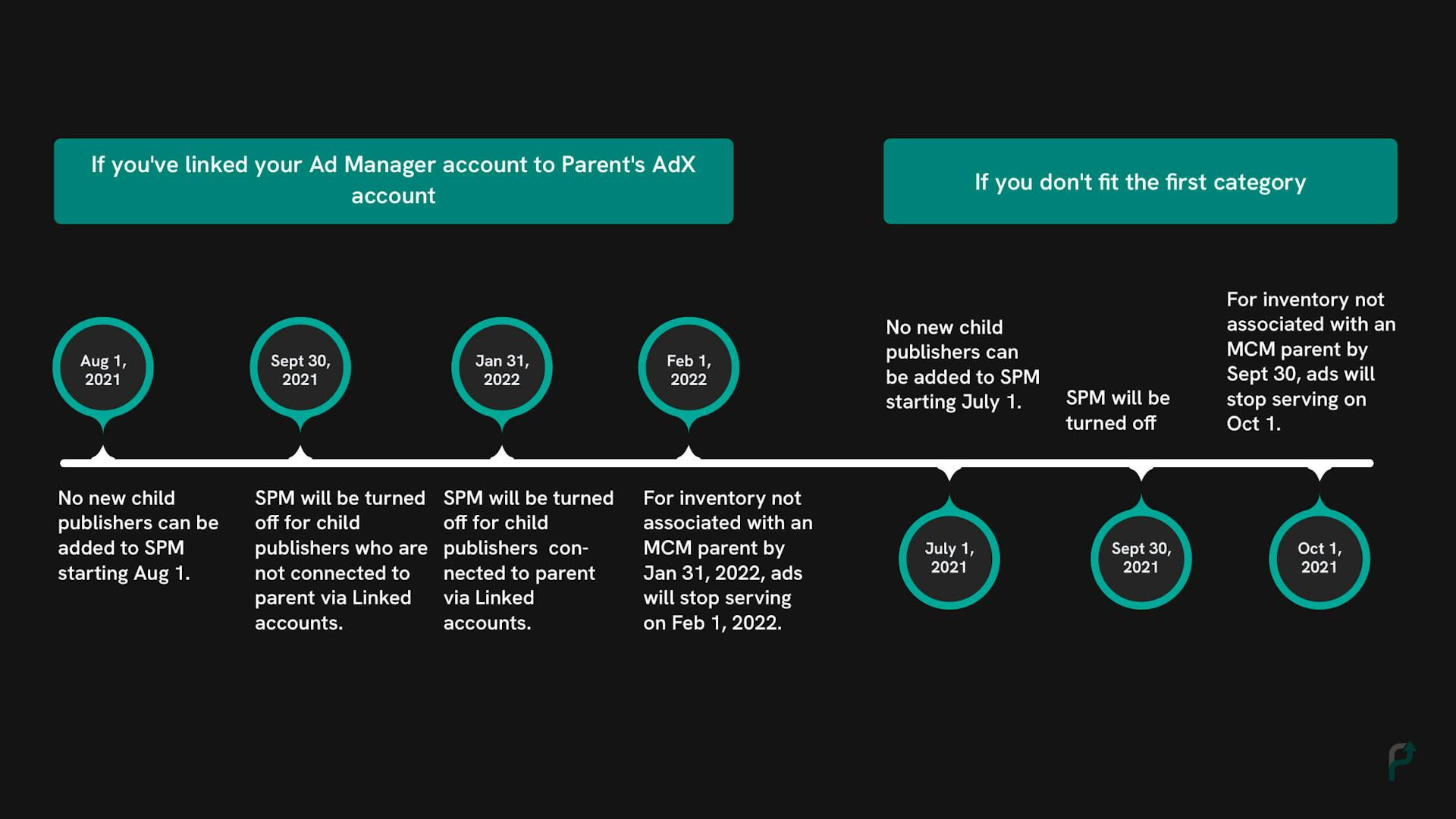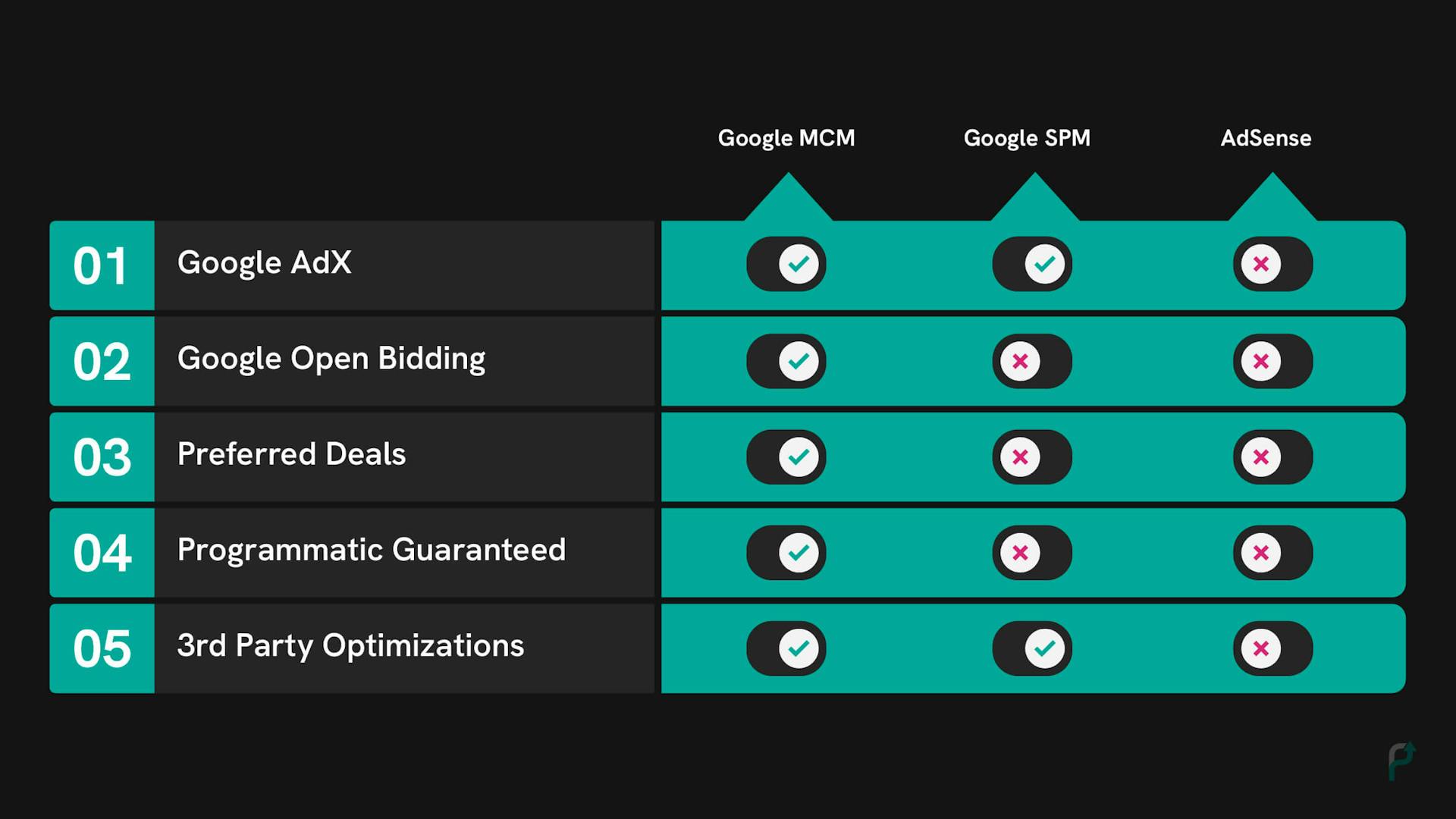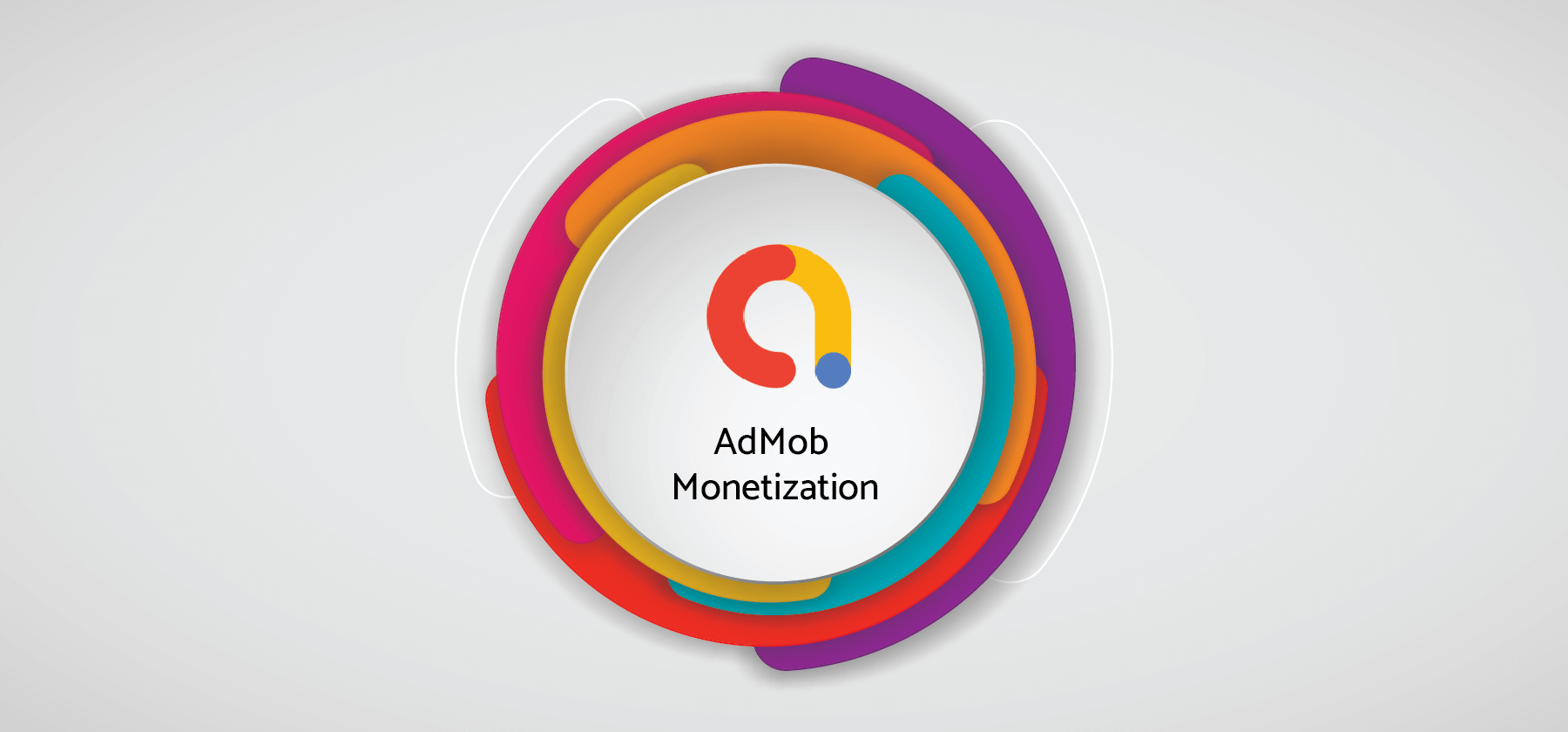- This blog discusses how Google MCM came into the picture and what it is.
- Also, it talks about the multiple delegation types of Google MCM
Google, founded in 1998, introduced Google Ads in 2000, which allowed it to expand its reach beyond an Internet search engine. The Google advertising ecosystem has since evolved rapidly to include millions of websites, apps, shopping platforms, media, and news channels. Recently, Google replaced Scaled Partner Management (SPM) with Google MCM (Multiple Customer Management) to modify its existing ad structure.
Google's MCM program offers superior benefits compared to SPM. It provides unique features that improve transparency, security, and efficiency for publishers using programmatic advertising. Despite this, some publishers and advertisers are unclear about its advantages. Let's clear up any confusion and dispel misconceptions about Google MCM.
Google SPM - Brief overview
Google SPM is the abbreviation for the Scaled Partner Management program that Google introduced to solve publishers’ challenges with Google AdX. That’s because many publishers could not qualify for direct AdX integration.
Google launched the Scaled Partner Management program to allow publishers access to Google Ad Exchange (Google AdX) via third-party app monetization platforms. With SPM, publishers can showcase their ad inventory before a larger pool of advertisers, increasing their reach and ad revenue.
Google discontinued SPM in June 2021 and replaced it with Google Multiple Customer Management. SPM was fully depreciated by July 2021 and taken down from Google on February 1, 2022.
 SPM to MCM timeline
SPM to MCM timelineAre you looking for Google MCM partners?
Why did Google replace SPM with MCM
Scaled Partner Management posed several challenges. Publishers couldn't identify the end advertiser purchasing their ad space, and authorization levels were unclear. GAM MCM aims to solve these problems by offering better transparency and access to parent and child publishers.
Following are some of the main reasons why Google replaced SPM with Multiple Customer Management:
- It was harder to customize and add new features in SPM.
- Difficulty in managing publishers' authorizations
- Lack of transparency in ad inventory auction and selling
- Ad management was a complex approach
With Google's Multiple Customer Management, both parent and child publishers enjoy various benefits such as high transparency on ad exchange processes and ease of accessing Google Ad Manager (GAM).
Another reason behind Google's discontinuation of SPM is the time. SPM came into effect when GAM and Google AdX were different tools. With time, Google revolutionized almost every aspect of its advertising ecosystem, so why not SPM?
What is the Google MCM
Being a substitute for the SPM module, Google MCM is more than a Google-owned program. Google Multiple Customer Management is a tool within GAM 360 that enables child publishers to access Google Ad Exchange via selected Google MCM partners.
These Google MCM partners are authorized to represent, manage, and consult ad inventory on behalf of the child publishers. Since access to Multiple Customer Management features is available only to the parent publishers, Google has set strict parameters and qualifying criteria.
Similar to SPM, the Google MCM program also includes “Parent publisher (refers to a Google-certified third party publishing partner)” and “Child Publisher (independent or small publishers who want to access Google ad exchange through Google authorized publishers).” The delegation module differentiates Multiple Customer Management from Google SPM.
Continue reading to learn more about delegation types and their importance.
Google MCM Delegation Modules
Inventory delegation in Google MCM refers to the parent publisher’s permission to access the ad request delegated by the child publisher to the parent account. These child publishers use Multiple Customer Management delegation modules to connect with parent publishers to monetize their ad inventory.
Following are the Google multiple customer management delegation types currently working on Google.
-
Managed Inventory (MI) Delegation
Under the MCM-managed inventory delegation module, the parent publisher can access the ad request made by the child publisher. However, access and settings rights permissions remain with the child publisher.
-
Managed Account (MA) Delegation
Under the Google MCM managed account delegation module, the child publisher grants the parent publisher edit access to all the ad inventory in their account. With that, the parent publisher has the right only to manage and monetize child publishers' ad inventory.
Difference between MA and MI delegations
| Aspect | Managed Account | Managed Inventory |
|---|---|---|
| InVentory Access | Direct access to all child ad inventories | Direct access to only "Delegate ad inventories" |
| Maximum Number of Parent Publishers | 1 Parent Publisher | Upto 15 Parent Publishers |
| Access to Google Ad Manager Account | The Parent Publisher has access to the Ad Manager account of Child Publisher | The Parent publisher doesn't have to the Ad Manager account of Child Publisher |
| Ad Tag Implementation | Child's Ad Manager ad tags | Parent's Ad Manager ad tags |
| Payment Cycle | Payments are made to Child Publisher | Payements are made to Parent Publisher |
Are you looking for a Google MCM account?
How to access Multiple Customer Management
Whether you are a child publisher looking to access Google Ad Exchange through Google AdX Partner or are already working with an SPM partner but want to know the further steps, you must have a Google Ad Manager account in place.
As the next step, you need to search for approved Google MCM partners. While only selected SPM partners will have access to the MCM feature, you can check whether your current SPM publisher has access to MCM or not.
Your respective certified Google MCM partner (generally known as the parent publisher) will send you an invitation. As soon as you accept the invitation, your Google MCM partner will be able to access, manage, and monetize your ad inventory.
However, as mentioned earlier, you need to choose a befitting delegation type like the following:
-
In the case of a Managed Account
You will receive the payment directly from Google based on the terms mentioned in the revenue-share agreement. The parent publisher will manage all your inventory in your GAM MCM account and you will be able to track every activity associated with it. If you are attempting to monetize your websites, then you need to paste the GPT tag into your website that is generated in your GAM account.
-
In the case of Managed Inventory
After the approval process is done, you’ll provide your parent publishers with access to some specific ad inventory. Unlike the Manage Account delegation type, your partner cannot access or manage your GAM account. Instead, your parent publisher will set up, manage, and optimize the inventories using their GAM 360 account.
For app publishers, the approach to using MCM is straightforward. But, If you are attempting to monetize your websites, then you need to paste the GPT tag into your website. Your Google MCM partner will provide it.
Following is a sample GPT tag:
<head>
<script async src="<https://securepubads.g.doubleclick.net/tag/js/gpt.js>"></script>
<script>
window.googletag = window.googletag || {cmd: []};
googletag.cmd.push(function() {
googletag
.defineSlot('/1234567,1234/Travel', [300, 250], 'div-gpt-ad-1568729559138-0');
[...]
})
</script>
</head>
The code ‘1234567’ in the above represents the parent publisher’s network code, and ‘1234’ is the child publisher’s network code. While you add the GPT tag on your website, ensure that network codes are correctly placed in the correct .defineSlot() function.
Advantages of MCM over SPM
SPM is a Google program that requires child publishers to access Google AdX with the help of a parent publisher. In contrast, Google MCM is a GAM 360 tool that enables multiple-level permission in AdX, allowing both the publisher and child publisher to see complete data and authenticate it.
Higher transparency and a more robust publishing strategy are the basic advantages of Google MCM, but its advantages are more than just these two.
While SPM could provide publishers with quick access to Google AdX, Google Multiple Customer Management moves further to offer publishers access to open bidding, unlocking additional demand for their ad inventory.
 Difference between MCM and SPM
Difference between MCM and SPMList of top Google MCM partners
- PubScale
- OKO
- NeworMedia
- MonetizeMore
- PubGalaxy
A little self-plug
Like most of the Google-approved SPM partners who have already started to shift to the MCM program, PubScale has also successfully transitioned to Google multiple customer management and has become one of the Google MCM Partners.
The team at PubScale has also prepared strategic plans to help child publishers migrate easily to the MCM program. From sending invitations to publishers to guiding child publishers about using MCM, PubScale is allowing publishers to overcome various challenges.
Increase your ad revenue with the best Google MCM program!
Frequently asked questions by publishers
-
Is Google MCM accessible to all publishing partners?
Google always sets qualification criteria for the publisher. To become a certified MCM partner, publishers must adhere to these Google MCM policies (See 1.6).
-
What if my current publisher can't transit to MCM?
Google Multiple Customer Management has aligned some strict parameters for partnership, making it difficult for many existing SPM partners to qualify. If your publisher is not yet an approved MCM partner, you can contact authorized Google MCM partners and continue monetizing your ad inventory.
-
How can I shift to MCM from SPM?
Shifting to MCM from SPM requires you to link your Google Ad Manager account to the Parent's AdX account. Note that Google has deactivated ad serving on SPM Since 1 Feb 2022. Hence, you cannot show ads on your inventory unless you activate MCM.
The only ad platform built for developers by developers.
Contact us now for a product that fits your needs! It’s quick, simple and easy.

![Google MCM (Multiple Customer Management) Guide [2025] Google MCM (Multiple Customer Management) Guide [2025]](/_next/image?url=%2Fblogs%2Fgoogle-mcm-guide.jpg&w=3840&q=75)

